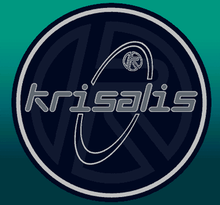Krisalis Software
Krisalis Software Limited was a British video game developer and publisher founded by Tony Kavanagh, Peter Harrap, and Shaun Hollingworth in 1987 under the name Teque Software Development Limited as a subsidiary label (beginning in 1988) until the official company name was changed to Krisalis Software in 1991. Originally, the name was intended to be Chrysalis Software Ltd., but a dispute with record company Chrysalis Records resulted in a minor spelling change. The company was restructured in April 2001 with a new management team of Tony Kavanagh, Tim James and Simeon Pashley and reused the original name of Teque Software development.
 Logo of Krisalis Software from 1995 to 2001 | |
Formerly | Teque Software Development Limited (1987) |
|---|---|
| Private | |
| Industry | Video games |
| Fate | Dissolved |
| Founded | 23 July 1987 |
| Defunct | 30 November 2001 |
| Headquarters | Rotherham, England |
Key people |
|
Krisalis Software worked on over 60 different computer and console games before permanently closing on 30 November 2001. Along with developing games and conversions themselves, they also provided sound development support for consoles like the Master System, the Game Gear and the Mega Drive through a proprietary Krisalis sound engine created by Shaun Hollingworth and handled by composer Matt Furnis which was used in many externally developed games for the aforementioned systems. Their final game development was a port of The F.A. Premier League Stars 2001 for the Game Boy Color, released on 8 June 2001.
Games developed
1987
1988
- Chubby Gristle (Amiga, Amstrad CPC, Atari ST, Commodore 64, ZX Spectrum)
- Laser Squad (MSX, conversion from ZX Spectrum)
1989
- Blasteroids (Amiga, Amstrad CPC, Atari ST, Commodore 64, MSX, MS-DOS, ZX Spectrum)
- Continental Circus (Amiga, Amstrad CPC, Atari ST, Commodore 64, MSX, ZX Spectrum)
- Thunderbirds (Amiga, Amstrad CPC, Atari ST, Commodore 64, MSX, MS-DOS, ZX Spectrum)
- Passing Shot (MSX conversion from ZX Spectrum)
1990
- Badlands (Amiga, Amstrad CPC, Atari ST, Commodore 64, ZX Spectrum)
- Manchester United (Acorn Archimedes, Amiga, Amstrad CPC, Atari ST, Commodore 64, ZX Spectrum)
- Jahangir Khan's World Championship Squash (Acorn Archimedes, Amiga, Amstrad CPC, Atari ST, Commodore 64, MS-DOS, ZX Spectrum)
- Mad Professor Mariarti (Acorn Archimedes, Amiga)
1991
- Manchester United Europe (Acorn Archimedes, Amiga, Amstrad CPC, Atari ST, Commodore 64, MS-DOS, ZX Spectrum)
- Face-Off (Amiga, Atari ST)
- Rogue Trooper (Amiga, Atari ST)
- Hill Street Blues (Amiga, Atari ST, MS-DOS)
1992
- Laser Squad (MS-DOS)
- European Club Soccer (Mega Drive)
- European Football Champ (Amiga, Atari ST, Commodore 64)
- Sabre Team (Amiga, Amiga CD32, Atari ST, MS-DOS)
- John Barnes European Football (Amiga, Amiga CD32, Atari ST)
1993
- Soccer Kid (3DO, Amiga, Amiga CD32, MS-DOS, Game Boy Advance, PlayStation, SNES)
- Arabian Nights (Amiga, Amiga CD32)
1994
- Alone in the Dark (3DO)
- Manchester United Premier League Champions (Amiga, Amiga CD32, MS-DOS)
- Big Four (Amiga, MS-DOS)
1995
- Alone in the Dark 2 (3DO)
- Manchester United: The Double (Amiga, MS-DOS)
- Manchester United Championship Soccer
1996
- Legends (Amiga, Amiga CD32, MS-DOS)
- Player of the Year (MS-DOS)
- Starfighter 3000 (MS-DOS)
1997
- Ultra CD-i Soccer (Philips CD-i)
- Z (PlayStation, Saturn)
1998
- Lego Chess (Windows)
- Theme Hospital (PlayStation)
1999
- F.A. Manager (PlayStation)
2000
- Legoland (Windows)
- Airport Tycoon (Windows)
- Cricket 2000 (PlayStation)
- The F.A. Premier League Football Manager 2000 (PlayStation)
2001
- The F.A. Premier League Stars 2001 (Game Boy Color)
Games published
1990
- World Championship Boxing Manager (MS-DOS)
- Jahangir Khan's World Championship Squash (Amiga, Amstrad CPC, Atari ST, Commodore 64, MS-DOS, ZX Spectrum)
- Manchester United (Acorn Archimedes, Amiga, Amstrad CPC, Atari ST, Commodore 64, ZX Spectrum)
- Mad Professor Mariarti (Acorn Archimedes, Amiga)
1991
- Revelation (Acorn Archimedes, Amiga, Atari ST)
- Manchester United Europe (Amiga, Amstrad CPC, Atari ST, Commodore 64, MS-DOS, ZX Spectrum)
- Face-Off (Amiga, Atari ST)
- Rogue Trooper (Amiga, Atari ST)
- Hill Street Blues (Amiga, Atari ST, MS-DOS)
- Chuck Rock (Acorn Archimedes)
1992
- John Barnes European Football (Amiga, Amiga CD32, Atari ST)
- Graham Taylor's Soccer Challenge (Amiga, Atari ST)
- Sabre Team (Amiga, Amiga CD32, Atari ST, MS-DOS)
- Shadoworlds (Amiga, Atari ST, MS-DOS)
1993
- Soccer Kid (3DO, Amiga, Amiga CD32, MS-DOS, Game Boy Advance, PlayStation, SNES)
- Arabian Nights (Amiga, Amiga CD32)
1994
- Manchester United Premier League Champions (Amiga, Amiga CD32, MS-DOS)
- Fly Harder (Amiga, Amiga CD32)
- Traps 'n' Treasures (Amiga)
1995
- Manchester United: The Double (Amiga, MS-DOS)